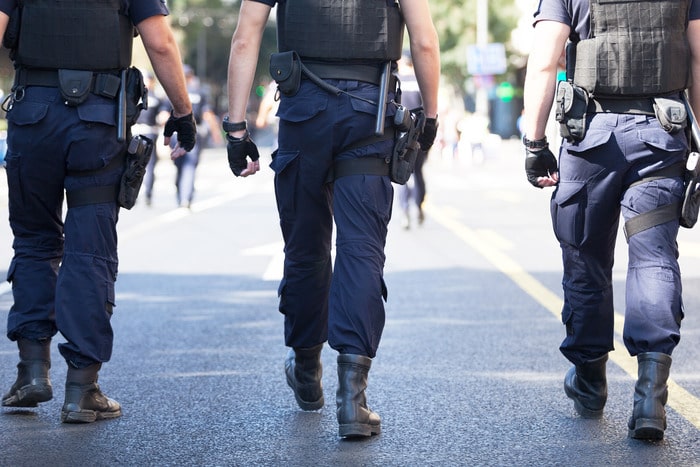
- August 19, 2023
- |security guard company
- | 0
Handle Medical Emergencies –
While armed security guards are primarily associated with maintaining safety and security, their role often extends beyond traditional security tasks. As a respected armed security guard company, XPressGuards understands the importance of being well-rounded professionals capable of handling various situations, including medical emergencies and non-security-related incidents. This article delves into the specialized training armed security guards receive to effectively respond to medical emergencies and other non-security situations, highlighting their versatility and commitment to public safety.
1. Comprehensive First Aid and CPR Training
Basic Life Support (BLS) Training: Armed security guards undergo BLS training that covers cardiopulmonary resuscitation (CPR), automated external defibrillator (AED) usage, and basic first aid techniques.
Immediate Response: Armed guards are trained to initiate CPR and administer basic first aid while waiting for medical professionals to arrive.
2. Medical Emergency Assessment
Recognizing Medical Emergencies: Armed security guards are educated on identifying signs and symptoms of medical emergencies such as heart attacks, strokes, seizures, and diabetic crises.
Assessing Severity: Guards assess the severity of the situation, determine whether immediate medical attention is required, and communicate effectively with emergency medical services (EMS).
3. Effective Communication
Dispatching Help: Armed security guards communicate promptly and clearly with emergency services, providing essential information about the situation and the location.
Reassuring Individuals: During medical emergencies, guards communicate with individuals involved, providing reassurance and guidance while awaiting medical assistance.
4. Crowd Control and Assistance
Managing Crowds: In situations where medical emergencies occur in crowded environments, armed security guards manage the crowd to ensure that medical personnel can access the scene quickly.
Directing Traffic: Guards may assist in directing traffic and clearing the way for EMS vehicles to reach the scene faster.
5. Non-Security Incident Response
Public Assistance: Armed guards may provide assistance to the public in non-security incidents, such as helping lost individuals find their way or providing directions.
Basic Problem-Solving: Guards are trained to handle minor disruptions, such as assisting individuals with vehicle problems or directing them to relevant services.
6. Fire and Evacuation Drills
Fire Safety Training: Armed security guards undergo fire safety training, which includes recognizing fire hazards, using fire extinguishers, and evacuating people from buildings.
Emergency Evacuation: Guards are trained in conducting orderly and efficient evacuations, ensuring the safety of all individuals within the premises.
7. Collaborating with Emergency Services
Effective Handover: Armed security guards collaborate with emergency services, providing accurate and detailed information about the incident upon their arrival.
Assisting Medical Personnel: Guards assist medical personnel by providing relevant information, directing them to the scene, and helping transport injured individuals.
8. Cultural Competence and Sensitivity
Cultural Awareness: Armed security guards are trained to be culturally sensitive and considerate when dealing with individuals from diverse backgrounds during medical emergencies.
Respectful Communication: Guards communicate respectfully and empathetically, taking into account cultural differences and potential language barriers.
9. Regular Training Updates
Ongoing Learning: Armed security guards participate in regular training updates to stay current on first aid techniques, medical protocols, and other non-security skills.
Scenario-Based Training: Guards engage in scenario-based training that simulates real-life medical emergencies and non-security incidents, allowing them to practice their response.
10. Effective Decision-Making
Critical Thinking: Armed security guards are trained to think critically and make swift decisions in high-pressure situations, ensuring the safety and well-being of everyone involved.
Prioritizing Safety: Guards prioritize safety above all else, whether it’s rendering first aid, directing individuals to safety, or collaborating with emergency services.
The role of armed security guards extends beyond security and law enforcement tasks. Through specialized training, armed guards are equipped to handle medical emergencies and other non-security situations with professionalism, compassion, and efficiency.
Their ability to provide immediate assistance, communicate effectively, and collaborate with emergency services contributes to a safe and secure environment for all. As a dedicated armed security guard company, XPressGuards recognizes the importance of well-rounded training to ensure that guards are prepared to respond effectively to a wide range of scenarios, fostering public safety and confidence. Contact us to learn more now.


